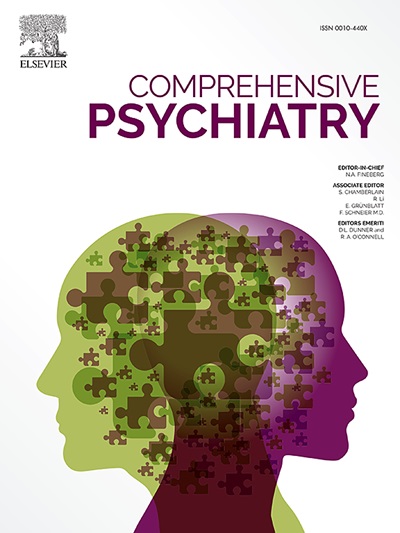Sociocultural and perinatal health factors associated with Autism spectrum disorder (ASD) in children
IF 4.2
2区 医学
Q1 PSYCHIATRY
引用次数: 0
Abstract
While previous research has examined perinatal factors in the context of Autism Spectrum Disorder (ASD), studies focusing on sociocultural factors is limited. We conducted a cross-sectional analysis utilizing data from the Australian Autism Biobank (AAB), which encompasses autistic children aged 2–17, their siblings, parents, and unrelated controls. Employing multivariable regression analyses, we aimed to identify factors associated with ASD across various domains, spanning health and lifestyle, perinatal, and postnatal contexts. Importantly, our analyses were adjusted for critical sociodemographic covariates. Advanced maternal age, male sex at birth, and identifying as from culturally and linguistically diverse (CALD) background, were found to be associated with risk of ASD. Pre-existing chronic health conditions in both parents and paternal medication use before conception were also associated with ASD risk in children. Associations with complications during pregnancy, caesarean delivery, and maternal medication use during pregnancy were also found. Postnatal factors of interest included the presence of health conditions (e.g., epilepsy), infections in early-life (e.g., respiratory infections), and atypical development in the first six months of life (e.g., hypotonia). These insights can guide closer monitoring and support for those with pre-existing vulnerabilities especially in terms of certain perinatal and sociocultural characteristics.
与儿童自闭症谱系障碍(ASD)相关的社会文化和围产期健康因素
虽然以前的研究已经检查了自闭症谱系障碍(ASD)背景下的围产期因素,但关注社会文化因素的研究有限。我们利用澳大利亚自闭症生物银行(AAB)的数据进行了横断面分析,其中包括2-17岁的自闭症儿童、他们的兄弟姐妹、父母和不相关的对照组。采用多变量回归分析,我们旨在确定与ASD相关的各个领域的因素,包括健康和生活方式、围产期和产后环境。重要的是,我们的分析针对关键的社会人口协变量进行了调整。研究发现,高龄产妇、出生时为男性以及来自文化和语言多样性(CALD)背景与自闭症谱系障碍的风险相关。父母双方已有的慢性健康状况和父亲在怀孕前使用药物也与儿童患自闭症的风险有关。还发现与妊娠期并发症、剖腹产和孕妇妊娠期用药有关。值得关注的产后因素包括健康状况(如癫痫)、生命早期感染(如呼吸道感染)和生命前6个月的非典型发育(如张力低下)。这些见解可以指导更密切地监测和支持那些预先存在脆弱性的人,特别是在某些围产期和社会文化特征方面。
本文章由计算机程序翻译,如有差异,请以英文原文为准。
求助全文
约1分钟内获得全文
求助全文
来源期刊

Comprehensive psychiatry
医学-精神病学
CiteScore
12.50
自引率
1.40%
发文量
64
审稿时长
29 days
期刊介绍:
"Comprehensive Psychiatry" is an open access, peer-reviewed journal dedicated to the field of psychiatry and mental health. Its primary mission is to share the latest advancements in knowledge to enhance patient care and deepen the understanding of mental illnesses. The journal is supported by a diverse team of international editors and peer reviewers, ensuring the publication of high-quality research with a strong focus on clinical relevance and the implications for psychopathology.
"Comprehensive Psychiatry" encourages authors to present their research in an accessible manner, facilitating engagement with clinicians, policymakers, and the broader public. By embracing an open access policy, the journal aims to maximize the global impact of its content, making it readily available to a wide audience and fostering scientific collaboration and public awareness beyond the traditional academic community. This approach is designed to promote a more inclusive and informed dialogue on mental health, contributing to the overall progress in the field.
 求助内容:
求助内容: 应助结果提醒方式:
应助结果提醒方式:


